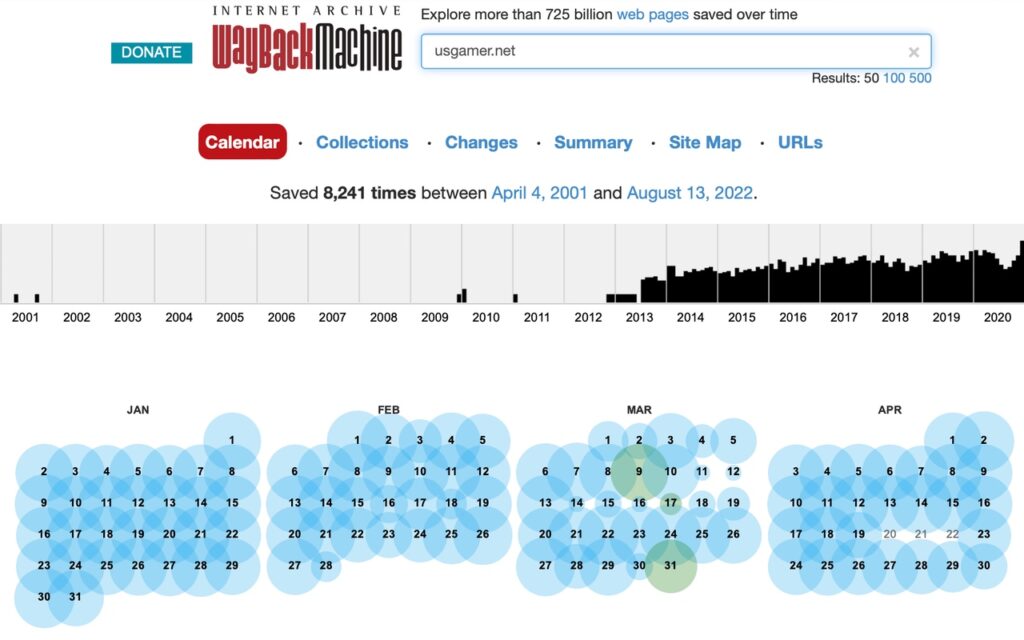Another video game website will soon disappear, along with nearly a decade of articles. In the digital age, more has to be done to preserve video games coverage and criticism.
Last month, former editor Kat Bailey revealed that USGamer.net is soon to be taken offline by owners Gamer Network and ReedPop.
USGamer was launched as a sister site to Eurogamer in 2013 with a remit to provide high-quality news reporting and feature content with a North American perspective. Despite the silly name, it was a consistently excellent publication. Under the editorial stewardship of Jeremy Parish, Jaz Rignall, and Kat Bailey, USGamer was home to a superb and diverse lineup of writers, including Mike Williams, Nadia Oxford, Mathew Olson, Eric Van Allen, Caty McCarthy, and Matt Kim, among many others.
The site found an audience with an enthusiastic approach that balanced thoughtful criticism with top-tier news reporting. It also built a readership appreciative of its deep-cut RPG content, serving fans with insightful coverage of the genre’s most obscure backwaters. This eventually resulted in the Axe of the Blood God podcast, which continues to this day as an independent production.
Budget cuts stripped the site of staff in September 2020, and – with ReedPop’s event income affected by the coronavirus pandemic – USGamer stoped publication in December 2020. At the time of writing, the site remains online, but it’s likely to disappear soon.
For an industry that frequently – and correctly – cries foul over the preservation of video games, it’s a shame to see a company the size of ReedPop choose not to keep a site of USGamer’s quality live.

Bailey says that some USGamer articles will be migrated to VG247.com, another Gamer Network site. Although VG247 will benefit from receiving USGamer’s most valuable and Google-friendly work, it is safe to assume that many pieces won’t make the trip.
As is often the case, fans have come to the rescue. Former USGamer staff writer Nadia Oxford has confirmed that Twitter user monke_ball has been hard at work preserving the site on Archive.org.
This is no small task and is hugely appreciated. However, for the average web user, USGamer will disappear. Any referring links to the site will probably result in a 404 page, and it will completely vanish from Google’s search results.
Unfortunately, this is not the first example of a video game site going offline. The pioneering 1up.com was closed in 2013 and has subsequently passed through several holding companies. The site is still live, but only just. It’s a shell of its former self, riddled with broken links and missing articles.
Joystiq closed in 2015, and although some of its content is now available on Engadget, the site in its original form is long gone. Add in the likes of GamePro and Edge Online, and swathes of high-quality writing and video content are no longer readily accessible or easy to find.
Speaking to Thumbsticks, Nadia Oxford says that more could be done.
“Games writing should absolutely be preserved whenever possible. Even now, looking back at old game magazines gives you an excellent window into the birth of systems, genres, and trends. Organizations like the Video Game History foundation is doing a great job keeping old magazines alive and in good shape, but it’s much trickier to preserve digital writing. Few people actually save articles, so they’re never even going to end up in a closet to be re-discovered. Fewer people will bother scouring http://Archive.org for old articles. Worse, it takes no time at all for articles to vanish from a site by the hundreds. A new tech person or a new CEO says, “Why do we even have this?”, presses a button, and it’s all gone – usually without warning. Even snapshots of old video game sites are hard to come by.”
The closure and removal of websites is obviously a challenge for games culture at large, but in an industry where freelancing is often the norm, it’s also problematic for writers. Oxford adds:
“I’ve been writing online content since 2004, and I’ve lost a lot of good work in that time – especially since I’m not the best at saving my work, unfortunately! I tend to get scatterbrained and lazy. Still, losing USgamer is probably the biggest sting I’ve felt. I’m forever working to improve my writing, but I feel like my writing style really matured on USgamer, and I produced some really cool stuff because of that. Kat was a great editor-in-chief, and Caty was a spectacular copy editor. It’s not just my work that’s going away; it’s some of the best writing about video games, period.”

As technologies change and companies go out of business, websites are just assets to be lost in the mix. There’s a cost to keeping them alive, and it’s a cost many owners are not willing to meet.
It’s also important to remember that a website is more than just a collection of articles. Site designs, page layouts, and functionality all tell a story. They paint a picture, and as a historical record, they are invaluable. As Oxford says, Archive.org snapshots help to some extent, but they cannot replicate the experience of using a site as it was in its prime.
It’s something we’ve tackled in a small way here at Thumbsticks. We’ve recently revamped our site to give it a new focus. This change has made much of the content we published over the past five years off-topic, but we will make sure it’s still available under our Archive category. It’s a similar approach used by GoNintendo, which, following a recent site relaunch, preserved more than 15 years of content into an archive.
We rightly criticise companies like Nintendo, Sony, and Square Enix for their game preservation practices. But we should also ask that media owners do as much as they can to keep online publications alive – and content accessible – even when they are no longer a commercial concern.







